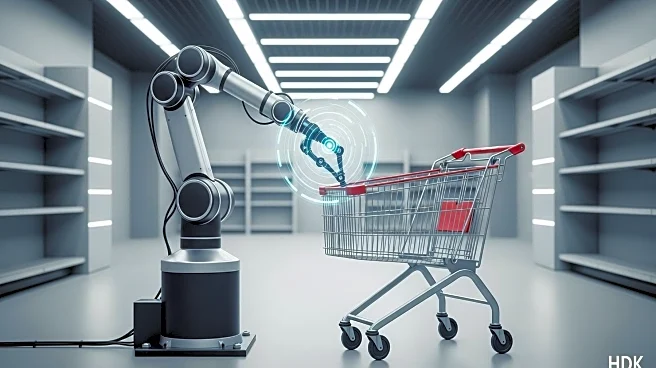What is the story about?
What's Happening?
Walmart, the largest employer in the United States, is projected to maintain a stagnant workforce over the next two to five years, despite anticipated growth in business volume. This announcement was made by Walmart US President John Furner during a recent conference. The decision not to expand the headcount is influenced by the increasing role of technology, particularly artificial intelligence (AI), in the company's operations. Walmart CEO Doug McMillon emphasized the transformative impact of AI on jobs, suggesting that AI will alter every job in some capacity. To support this technological shift, Walmart has appointed Daniel Danker as the executive vice president of AI acceleration, product, and design.
Why It's Important?
The decision by Walmart to keep its workforce stagnant while integrating AI technologies reflects broader trends in the retail industry and the economy. As AI becomes more prevalent, companies are likely to rely more on technology to drive efficiency and productivity, potentially reducing the need for human labor. This shift could have significant implications for employment rates and job security in the retail sector. While AI can enhance operational capabilities, it may also lead to job displacement, affecting workers who rely on traditional roles within the company. The move underscores the need for workforce adaptation and retraining to align with technological advancements.
What's Next?
Walmart's focus on AI integration suggests that the company will continue to invest in technology-driven solutions to enhance its business operations. This may lead to further developments in AI applications within the retail space, potentially setting a precedent for other companies to follow. As Walmart navigates this transition, stakeholders, including employees, industry analysts, and policymakers, will be watching closely to assess the impact on employment and business practices. The company's approach may influence future strategies in workforce management and technological adoption across the retail industry.
Beyond the Headlines
The integration of AI into Walmart's operations raises ethical and cultural considerations regarding the future of work. As AI technologies evolve, questions about privacy, data security, and the ethical use of AI in decision-making processes become increasingly relevant. Additionally, the cultural shift towards technology-driven work environments may require changes in employee training and development programs to ensure workers are equipped to handle new technologies. These factors highlight the need for comprehensive policies and frameworks to address the challenges and opportunities presented by AI in the workplace.















